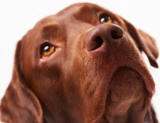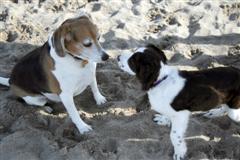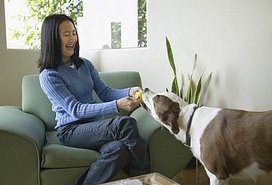
Click on
Library Icon
to learn more
|
Preventing Canine Aggressive Play
Introduction
Aggressive play means a
human and dog playing together while allowing the
dog to growl, snap, and play bite during the mock
battle. This type of play can be very confusing to
dogs because of the mixed messages that it conveys -
the owner is saying that it is okay to display
aggressive behavior when they are acting out their
mock battle but never at any other time. Therefore,
aggressive play in dogs with aggressive tendencies
tends to make the problem worse and should be
discontinued. However, for dogs that do not show any
aggression by nature and merely like to play by
wrestling, this type of play can be participated in
as long as it is played by the rules.
|
Aggressive play in dogs with
aggressive tendencies tends
to make the problem worse
and should be discontinued. |
 Normal
Canine Behavior Normal
Canine Behavior
It is normal for puppies to
tumble and roll when they play just like little boys
on the grass. It is also normal for puppies to bite
each other during playtime. This biting, with sharp
little puppy teeth, helps the puppies learn how to
inhibit their bites. It they bite too hard, the
other puppy squeals and may even refuse to play for
awhile. Play is one of the strongest motivators for
puppies. It is a natural source of fun and
fellowship as well as a way to learn social skills.
Horse Play
or Foul Play?
1) The
dog must not start or stop play sessions
as a reminder to the dog that the human
is higher in status and the rule-maker.
Beginning and ending the game is also a
form of control. Pushy dogs
should never be allowed to think they
control a human's actions.
2) The dog must "sit"
to earn the
play session. This "deference posture" helps to
reinforce the innate social structure of the dog as
subordinate. Just this simple step helps to teach
the dog to look to his or her people for cues about
what is acceptable behavior.
3) At least once during the play
session, the person should stop and
instruct the dog to
"sit."
In other words, the person should be
able to control the game
at all times.
 4) During the play sessions, if the
dog's teeth apply any more than gentle pressure on
skin or clothes, the game stops. You may decide the
rule is NO canine teeth touches human skin or
clothing. It is recommend to teach the dog a soft or
inhibited mouthing prior to teaching the dog NEVER
to mouth or touch teeth on humans without
permission. 4) During the play sessions, if the
dog's teeth apply any more than gentle pressure on
skin or clothes, the game stops. You may decide the
rule is NO canine teeth touches human skin or
clothing. It is recommend to teach the dog a soft or
inhibited mouthing prior to teaching the dog NEVER
to mouth or touch teeth on humans without
permission.
5) Families with children should not
allow aggressive play under any
circumstances. Play time must be
supervised. Do not allow children to
accidentally hurt a dog during play as
this can lead to aggression. |